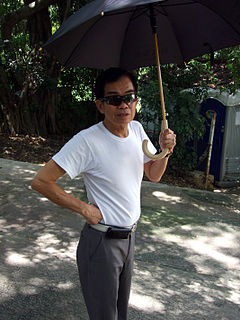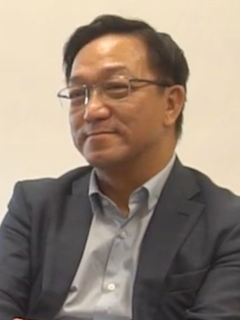Rural committee is a body representing the welfare of indigenous residents in the New Territories of Hong Kong. The chairman of each rural committee is the representative in the Heung Yee Kuk, and is ex officio member of a district council.

Lau Wong-fat, GBM, GBS, JP was a Hong Kong businessman and politician. He had been the long-time chairman of the Rural Council, the most powerful organ representing the interests of the New Territories indigenous inhabitants from 1980 to 2015. He was also a member of the Legislative Council of Hong Kong from 1985 to 2016. From 2009 to 2012 he was a non-official member of the Executive Council of Hong Kong. He had also served as the member of the Chinese People's Political Consultative Conference and chairman of the Regional Council and the Tuen Mun District Council.
Daniel Lam Wai-keung SBS, JP is the former Chairman of the Hong Kong Regional Council as well as a former member of the Legislative Council of Hong Kong.

The 2000 Hong Kong Legislative Council election was held on 10 September 2000 for members of the 2nd Legislative Council (LegCo) of the Hong Kong Special Administrative Region (HKSAR). The election returned 24 members from directly elected geographical constituencies, 6 seats from the Election Committee constituency and 30 members from functional constituencies, of which 9 uncontested.

Wang Chau is an area of Yuen Long District, Hong Kong, located west of the Shan Pui River.

The 2007 Hong Kong District Council elections were held on 18 November 2007. Elections were held to all 18 districts of Hong Kong, returned 405 members from directly elected constituencies out of total 534 councils member. A total number of 886 candidates contesting in 364 seats, while 41 seats were uncontested. A total number of 1.4 million voters cast their ballots, consisting 38% of the electorate, significantly lower than the last elections in 2003.

North District Council is one of the 18 Hong Kong district councils and represents the North District. Consisting of 22 members, the district council is drawn from 18 constituencies, which elect 18 members, along with four ex officio members who are the Ta Kwu Ling, Sheung Shui, Sha Tau Kok and Fanling rural committee chairmen. The latest election was held on 22 November 2015.

Yuen Long District Council is the district council for the Yuen Long District in Hong Kong. It is one of 18 district councils. Yuen Long District currently consists of 41 members, of which the district is divided into 35 constituencies, electing a total of 35 with 6 ex officio members who are the Shap Pat Heung, San Tin, Ha Tsuen, Kam Tin, Ping Shan and Pat Heung rural committee chairmen. The latest election was held on 22 November 2015.

The 2011 Election Committee subsector elections took place between 7:30 am and 10:30 pm on 11 December 2011. The Election Committee sub-sector elections are a part of the contemporary political process of Hong Kong. The election's purpose is to decide the 1,044 members of the Election Committee of Hong Kong. The resulting Election Committee is then responsible for electing the Chief Executive of Hong Kong Special Administrative Region (SAR) in the 2012 Election.

Leung Che-cheung, SBS, MH, JP is a member of Hong Kong Legislative Council and the former Chairman of the Yuen Long District Council for Tin Yiu in Tin Shui Wai. He is a member of Democratic Alliance for the Betterment of Hong Kong, a pro-Beijing party in Hong Kong and the president of the New Territories Association of Societies.
The Federation for the Stability of Hong Kong was a pro-Beijing rural political group representing the interests of the New Territories indigenous inhabitants active in the 1990s.
Choy Kan-pui, BBS, JP is a former Hong Kong legislator and Sha Tin villager. He ran in the Hong Kong district boards election, 1982 representing the Tin Sum village in Sha Tin where he rooted and continued his office until 2003. He was also the chairman of the Sha Tin District Council.

Brian Kan Ping-chee (簡炳墀) is a five-time champion horse trainer and politician in Hong Kong.
Chan Yat-sen, MBE, JP was a prominent Hong Kong politician and rural leader. He was a New Territories indigenous inhabitant and Chairman of the powerful Heung Yee Kuk, and was dubbed the "King of the New Territories".

The 2016 Hong Kong Legislative Council election was held on 4 September 2016 for the 6th Legislative Council of Hong Kong (LegCo). A total of 70 members, 35 from geographical constituencies (GCs) and 35 from functional constituencies (FCs), were returned. The election came after the rejection of the 2016/2017 constitutional reform proposals which suggested the electoral method for the 2016 Legislative Council remains unchanged.
The Tuen Mun Rural Committee is a rural committee in Hong Kong. It was founded by rural leader Chan Yat-sen in 1953 with representatives from 29 villages in Tuen Mun. Today the rural committee consisted of 36 villages and 69 village representatives.

Kenneth Lau Ip-keung, BBS, MH, JP is a New Territories rural leader in Hong Kong. He is the current chairman of the Heung Yee Kuk and member of the Legislative Council of Hong Kong for the Heung Yee Kuk functional constituency, succeeding his father Lau Wong-fat in 2015 and 2016 respectively. He has been a non-official member of the Executive Council of Hong Kong since 2017.

The 2016 Election Committee subsector elections were held on 11 December 2016 for 1,034 of the 1,200 members of the Election Committee (EC) which is responsible for electing the Chief Executive of Hong Kong (CE) in the 2017 election.

Bowie Hau Chi-keung is a rural leader and businessman in Hong Kong. He is the current chairman of the Sheung Shui Rural Committee, ex officio executive committee member of the Heung Yee Kuk and ex officio member of the North District Council.















